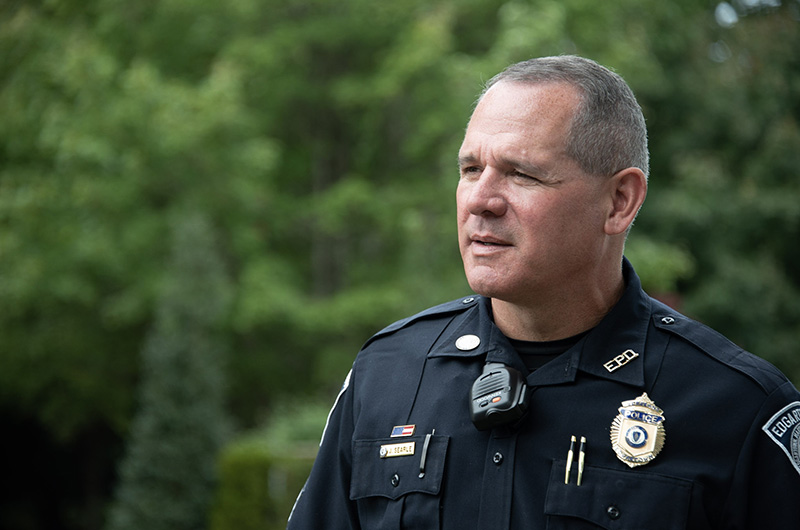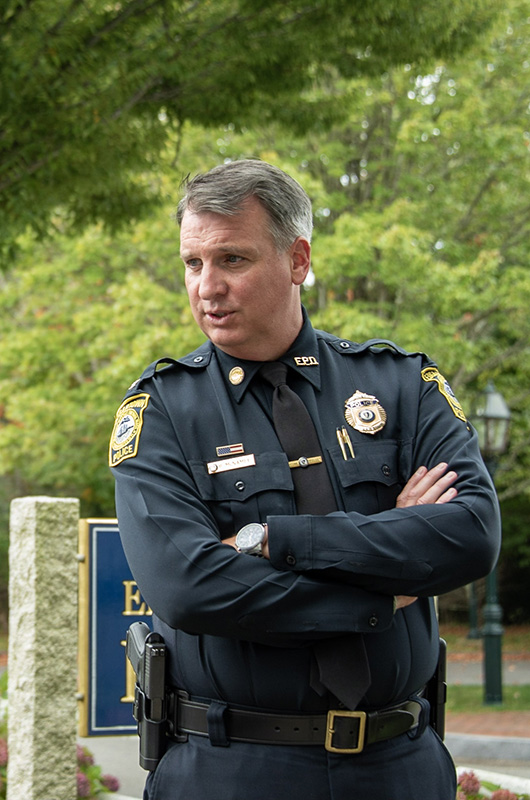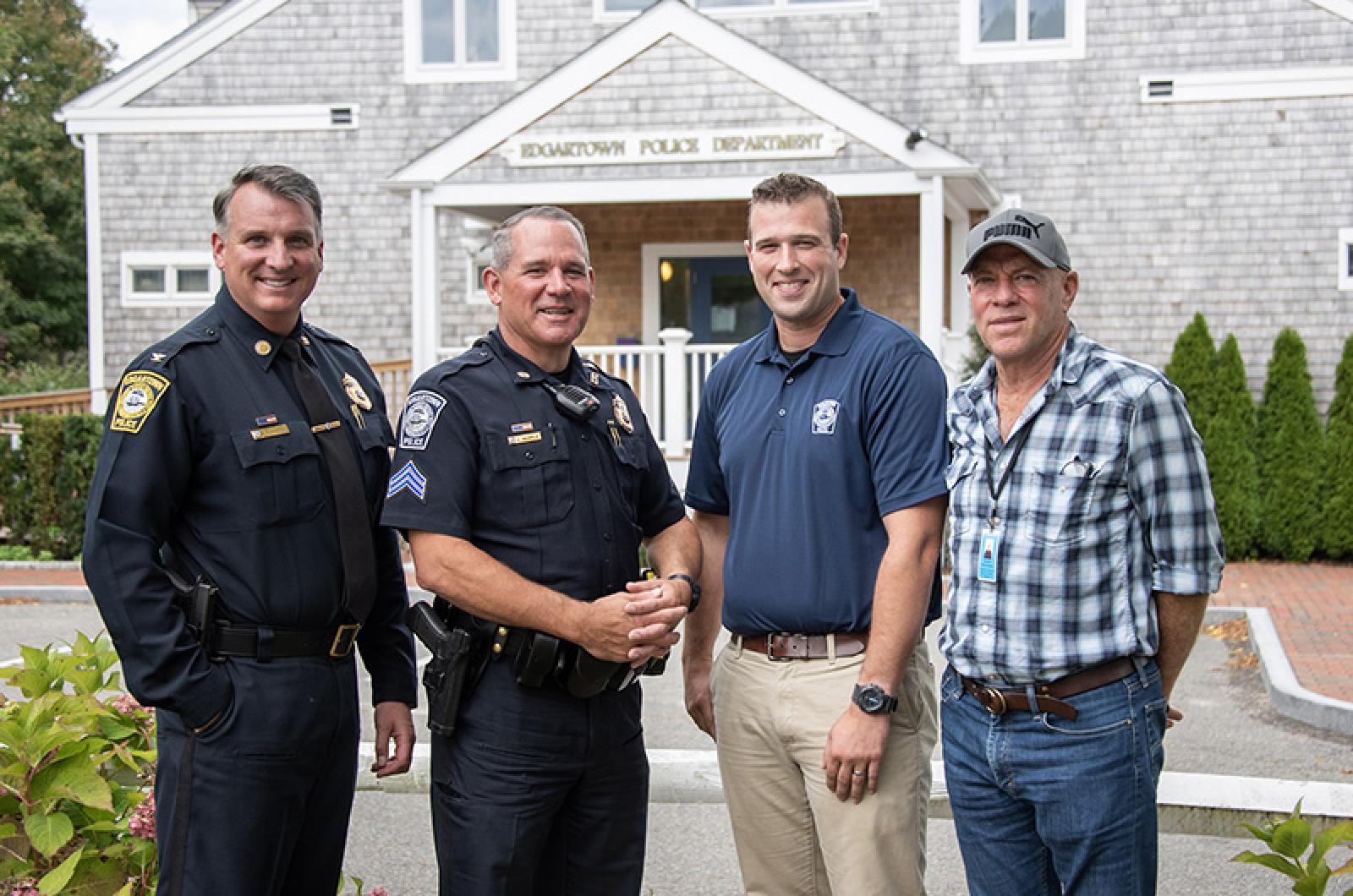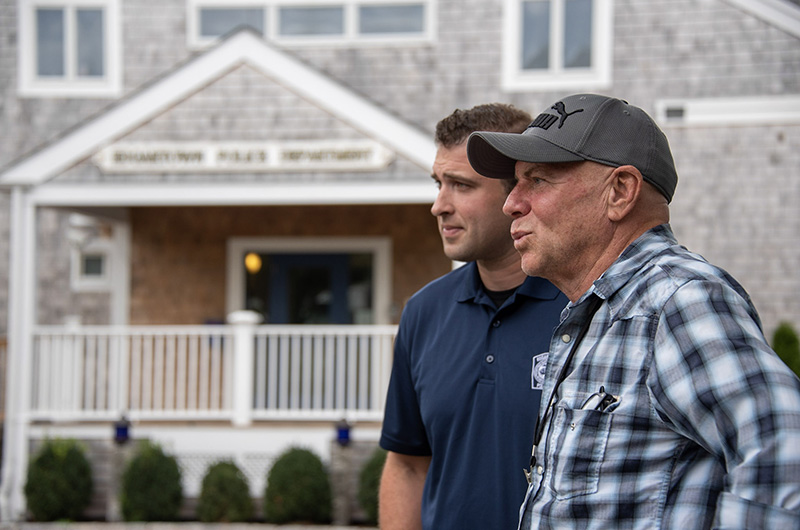When a person is struggling with a substance use disorder on the Island, police officers are often among the first to know. They arrive first on the scene after a drunk driving accident, place intoxicated people in protective custody when they pose a danger to themselves or others and administer life-saving Narcan after an overdose is reported.

“It’s sort of a cliché but I keep saying it. Police have a front seat to these things happening. We see it. We know,” said Edgartown police chief Bruce McNamee.
In recent months Edgartown police have begun to take a more intentional approach with people they know to be struggling with substance use disorder. Acting in partnership with recovery coaches from Island health agencies, they have launched an initiative they are calling Project Outreach. It is based on similar models in other departments across the country that were developed as the opioid crisis intensified.
The day after an incident involving unsafe and clearly habitual substance use, an officer and a recovery coach reach out to the person with a problem and ask for a meeting. Criteria vary, but use of Narcan always triggers a follow-up. Usually wearing plain clothes and arriving in an unmarked car, the officer and recovery coach sit down with the person and discuss options. They range from attending a recovery program meeting on the Island to forming a relationship with providers at Martha’s Vineyard Community Services to packing up to spend time at a detox facility on the Cape. In Edgartown, officer Curtis Chandler, a relatively new patrolman and
Island native, and Sgt. Jonathan Searle, a senior officer who has worked with the department since the 1980s, lead the program, which officially began about eight months ago. Both officers are trained recovery coaches, and they work closely with Brian Morris and Stacy Wise, recovery coaches from Island Health Care. So far, the officers and recovery coaches have followed up with seven community members struggling with substance use disorder through the new program.
“All of a sudden there’s two people in your living room, not threatening you, not anything. Just saying, How about trying this?” Sergeant Searle said.
All who are involved say the program has empowered the recovery coaches to reach more people in crisis and has empowered law enforcement officers to quickly help people access treatment. Mr. Searle recalled an incident some years ago when it took nine days to find placement for an Edgartown resident in a detox facility. Now, with Mr. Morris’s help, that can happen much more quickly — even in the same day.
The officers and Mr. Morris said they see people who have varying addictions, but alcoholism is the most prevalent.

“Opioids are bad here, but alcohol is still the number one problem,” Mr. Morris said.
“We deal with alcoholism a lot more than opiate addiction,” Sergeant Searle
agreed. He added: “If you’re placing someone into protective custody four and five times a week, why not approach that person?”
Chief McNamee spent two decades as an officer in Plymouth before joining Edgartown two years ago, where he helped to put a similar program in place.
He said the difference in drinking culture between the two towns is striking.
“My previous department had far more pouring establishments than my town does now, however it seems as though my officers now are called to deal with intoxicated adults far more than my other department,” he said.
The Island has no detox facility and too small a population to make a facility feasible. As an alternative, two years ago with the help of a private donor, Community Services and the Martha’s Vineyard Hospital signed a memorandum of understanding that expedites admission to three off-Island facilities: Gosnold Treatment Center in Falmouth, AdCare in Worcester and SSTAR in Fall River.
Mr. Morris said it is important to make sure the person is accompanied all the way to detox.
“A lot can go sideways between here and there,” he said. “The warm hand-off is a key ingredient.”
Sergeant Searle recalled working with a woman who decided to immediately be admitted to a detox facility after sitting down with him and Mr. Morris. He said the experience was an example of the benefits of combining police work with recovery coaching.
“With the police component, we tracked her down. And she didn’t want to be found,” the sergeant said. “Nobody had ever approached her in a non-punitive way regarding her substance abuse.”
A person in recovery himself who was treated at Gosnold in 2012, Mr. Morris said he always prioritizes people’s dignity. He emphasized treatment, not punishment.
“I wish when I was in the abyss of my madness, there was somebody trying to help me,” he said.
He said when he works with the officers, he builds rapport as someone who has been there, while they build rapport based on existing relationships they have formed in the community.
“I’m not telling people what to do,” Mr. Morris said. “We’re just going to open some doors for you. Perhaps you want to walk through them.”
Edgartown officers often refer people to Project Outreach, but family members and schools have also flagged concerns. People with substance use issues who are asking for help are generally not charged with a crime related to the substance use, police said.
Edgartown is so far the only department on the Island to pursue an official partnership with recovery coaches and to institute consistent follow-ups, but other Island police departments have indicated interest in following suit. Chiefs in Tisbury, Chilmark, Oak Bluffs, Aquinnah and West Tisbury all said they plan to increase collaboration with recovery coaches.
“Our hope is that we plant a seed,” Sergeant Searle said.
People experiencing a substance use crisis can contact a 24-hour helpline at Martha’s Vineyard Community Services at 508-693-0032.








Comments (1)
Comments
Comment policy »